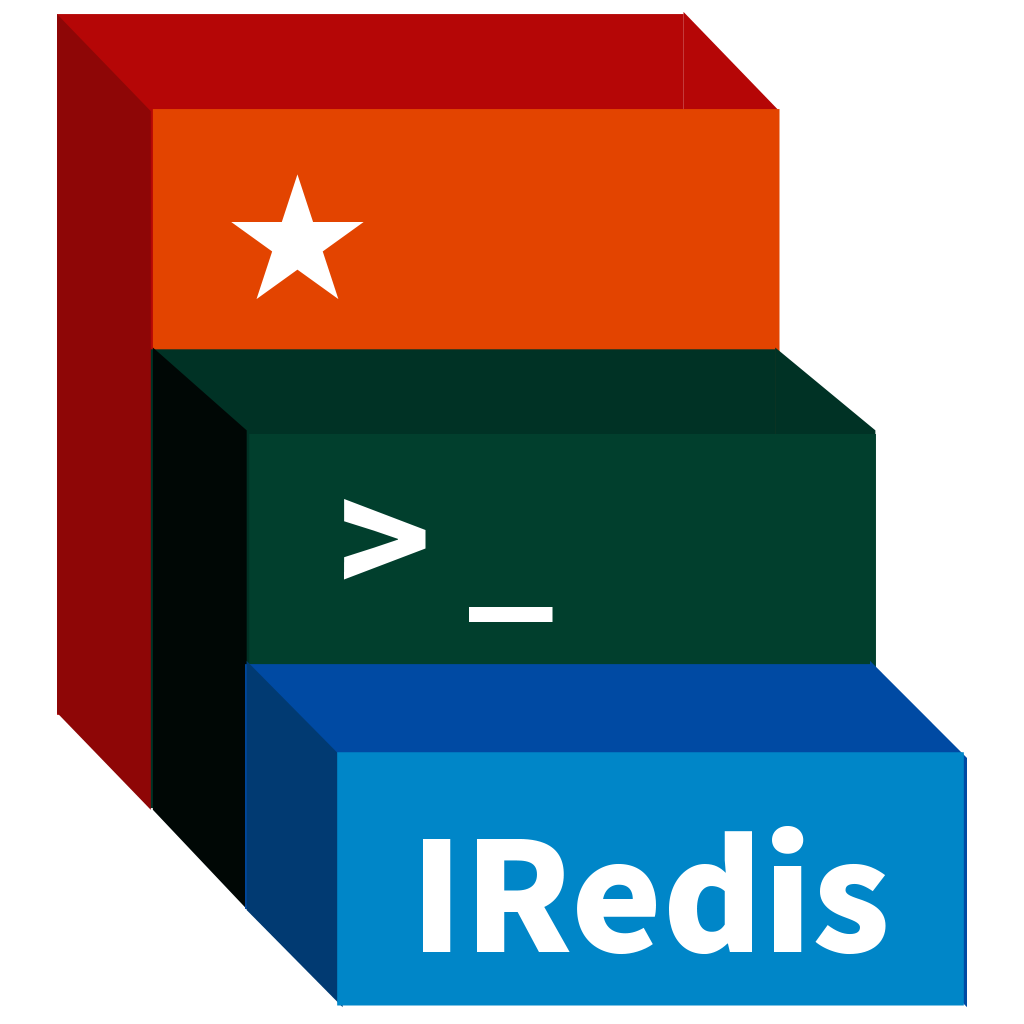Terminal client for Redis with auto-completion and syntax highlighting.
Project description
IRedis (Interactive Redis)

IRedis is a terminal client for redis with auto-completion and syntax highlighting. IRedis let you type Redis command smoothly, and display the response in a user-friendly format.
IRedis is an alternative for redis-cli. In most cases IRedis behaves exactly the same with redis-cli. Besides, it is safer to use IRedis on production server then redis-cli. IRedis will prevent accidently running dangerous command, like KEYS *(See here, the Latency generated by slow commands section. )
Features
- Advanced code completion. If you run command
KEYSthen runDEL, iredis will auto complete your command based onKEYSresult. - Command validation,(eg. try
CLUSTER MEET IP PORT, iredis will validate IP and PORT for you) - Command highlighting, fully based on redis grammar. Any valide command in iredis shell is a valide redis command.
- Human friendly response display.
- Ctrl + C to clear cureent line, won't exit redis-cli. Use Ctrl + D
- Say "Goodbye!" to you when you exit!
- Ctrl + R to open reverse-i-search to search through command history.
- Auto suggestions. (Like fish shell.)
- Support
--encode=utf-8, to decode Redis' bytes responses. - Command hint on bottom, include command syntax, supported redis version, and time complexity.
- Offcial docs build in
HELPcommand, tryHELP SET! - For full features, please see: iredis.io/show
Install
Install via pip:
pip install iredis
Recommended to use pipx:
pipx install iredis
Usage
Once you install IRedis, you will know how to use it. Just remember, IRedis
support similar options like redis-cli, like -h for redis-server's host
and -p for port.
$ iredis --help
IRedis support config files. The options from command line will always be the highest priority. The config files from high priority to low is:
- Options from command line
$PWD/.iredisrc~/.iredisrc(this path can be changed withiredis --iredisrc $YOUR_PATH)/etc/iredisrc- default config in iredis package.
You can copy the self-explained default config here:
https://raw.githubusercontent.com/laixintao/iredis/master/iredis/data/iredisrc
And then make your own changes.
Development
Release Strategy
The IRedis project was build and released by CircleCI, whenever a tag was pushed to master branch, a new release will be built and uploaded to pypi.org, it's very convenient.
Thus, we release as often as possible, so users can always enjoy the new features and bugfixes very quickly. Any bugfix or new feature will get at least a patch release, the big feature will get a minor release.
Setup Environment
iredis favors poetry as a packagement tool. You can setup a develop envioment on your computer easily.
First, install poetry(You can do it in a python's virtualenv):
pip install poetry
Then run(which euqals pip install -e .):
poetry install
Be careful running testcases, it may flush you db!!!
Development Logs
Since this is a commandline tool, so we didn't write logs to stdout.
You can tail -f ~/.iredis.log to see logs, the log is pretty clear,
you can see what actually happend from log files.
CI
We use pexpect to test commandline behavior, since there are problems with circleci's tty, so we run pexpect-related tests on travis, and run unittest/black style check/flake8 check on circleci.
For local development, you just run pytest, if all tests passed locally, it
shall be passed on CI.
Command Reference
There is a full Redis command list in commands.csv file, downloaded by:
python scripts/download_redis_commands.py > data/commands.csv
commands.csv is here only for test if redis.io was updated, do not package it into release.
Current implemented commands: command_syntax.csv.
Planned Features
Please see issue. And you are welcome to submit one.
Related Projects
Project details
Release history Release notifications | RSS feed
Download files
Download the file for your platform. If you're not sure which to choose, learn more about installing packages.
Source Distribution
Built Distribution
File details
Details for the file iredis-0.9.1.tar.gz.
File metadata
- Download URL: iredis-0.9.1.tar.gz
- Upload date:
- Size: 175.9 kB
- Tags: Source
- Uploaded using Trusted Publishing? No
- Uploaded via: twine/3.1.1 pkginfo/1.5.0.1 requests/2.22.0 setuptools/41.2.0 requests-toolbelt/0.9.1 tqdm/4.42.1 CPython/3.7.5
File hashes
| Algorithm | Hash digest | |
|---|---|---|
| SHA256 |
ac744fdf3a7bac453e60c8f04c14d0c91ba634019d3ecd57931a40ce89e50f1e
|
|
| MD5 |
efbb66bf7e55339e92715c0ba5b55bbe
|
|
| BLAKE2b-256 |
69c3e86c90fbbe94bda23ef553314d7beba933371be8b76e4f8f862c877f1a4b
|
File details
Details for the file iredis-0.9.1-py3-none-any.whl.
File metadata
- Download URL: iredis-0.9.1-py3-none-any.whl
- Upload date:
- Size: 256.4 kB
- Tags: Python 3
- Uploaded using Trusted Publishing? No
- Uploaded via: twine/3.1.1 pkginfo/1.5.0.1 requests/2.22.0 setuptools/41.2.0 requests-toolbelt/0.9.1 tqdm/4.42.1 CPython/3.7.5
File hashes
| Algorithm | Hash digest | |
|---|---|---|
| SHA256 |
4085a82f958e7317c203a34dec6fcd70aab268cd9cdb0659ccd3e92b9063d682
|
|
| MD5 |
bedde0597817f59b663b958c0f0f521f
|
|
| BLAKE2b-256 |
003a38a8eecbc5d88d504be74e43b4b027b06aa7bb31d4310654c204f5eadb6a
|

















